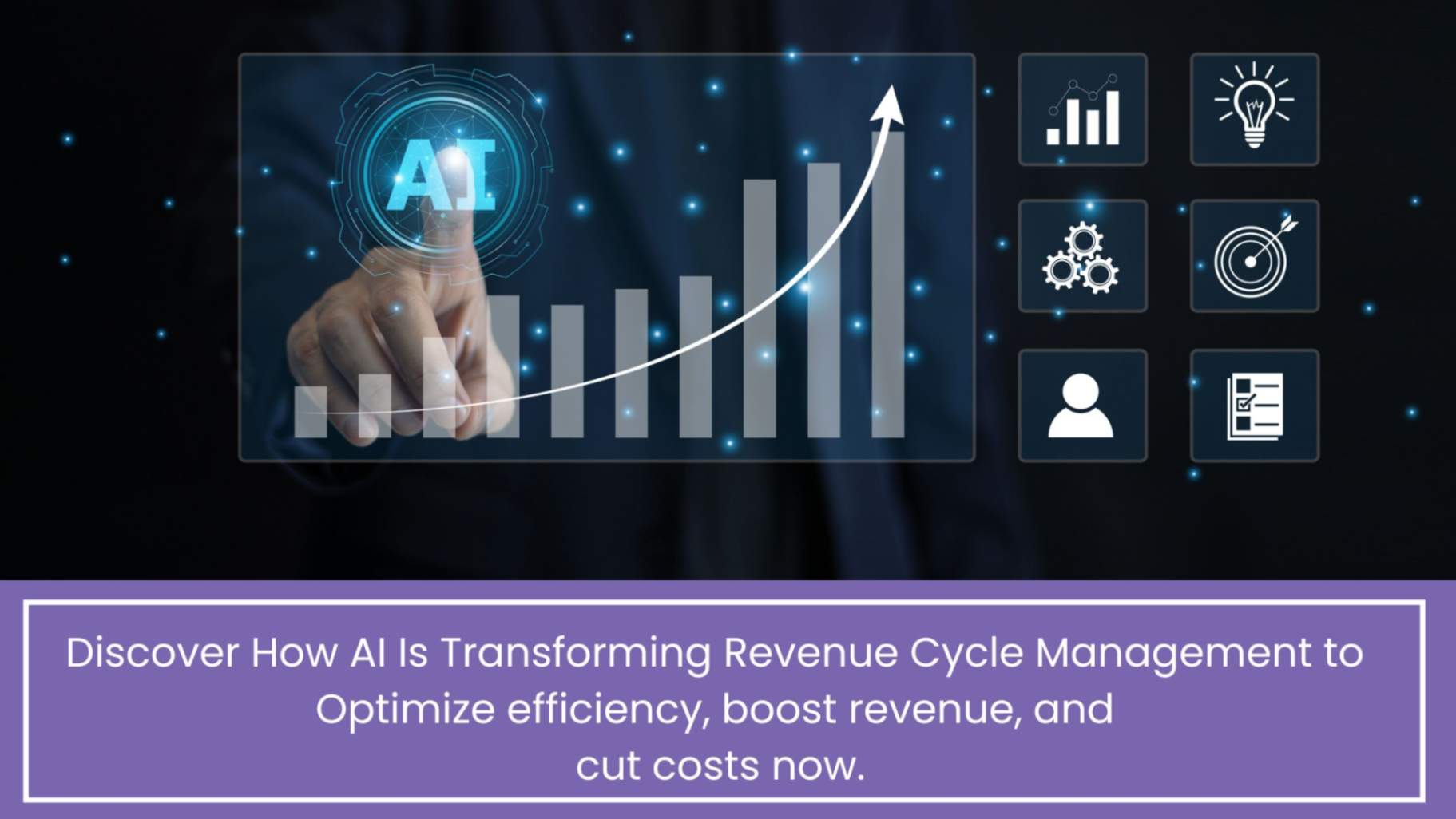How AI Is Transforming Revenue Cycle Management
Human error, manual procedures, and substantial financial leakage have long plagued the complex dance of how AI is transforming revenue cycle management.healthcare revenue cycle management (RCM). Every stage, from patient registration to the last payment, offers a chance for inefficiencies that could affect the financial performance of a healthcare business. Businesses are increasingly using artificial intelligence. This is causing a big change in the industry. This technology breakthrough is ushering in an era of unprecedented RCM profitability, accuracy, and efficiency. It marks a significant advancement in RCM. It is radically altering how AI is transforming RCM.
Table of Contents
How AI Streamlines the RCM Process from Claims to Collections
Departmental silos are common in traditional RCM procedures. Paper-based systems and human data entry are also frequent features. Delays, mistakes, and an extended revenue cycle are frequent results of this. AI-powered solutions offer a comprehensive strategy for AI revenue cycle automation. This strategy enables efficient and effective revenue cycle management. AI can automate monotonous operations. AI can also proactively detect problems and ensure a seamless information flow throughout the patient journey.
Examine the first phases: AI can reduce front-end denials in insurance verification. It rapidly confirms patient eligibility and benefits. AI can significantly reduce the time and resources needed for this procedure. This is because AI in prior permission can streamline the process. AI is transforming revenue cycle management. This simplification of pre-service duties allows for a more effective revenue cycle journey.
Role of Predictive Analytics in Reducing Claim Denials
Claim denials are one of the biggest problems in RCM. These can be caused by various factors. These factors include improper coding, omitted data, and problems with prior authorization. Finding and correcting denial patterns is time-consuming. It is a reactive procedure. Predictive analytics can be helpful in medical billing. It is useful in this situation. Large databases of past claims can be analyzed by AI algorithms. These algorithms can spot trends and forecast the possibility of a claim being rejected.
Healthcare professionals can address problems before submission. This proactive approach significantly lowers the denial rate.AI is used in denial management, but prediction is just one aspect of this field. AI can swiftly identify the reason for a denial. It can then suggest remedial measures and even automate the appeals process. AI is transforming revenue cycle management. It significantly impacts financial recovery.
AI vs. Manual Billing What Delivers Better RCM Performance?
The comparison between AI and manual billing is stark. Manual processes are slow. They also require a lot of work. Data entry, verification, and follow-up involve a lot of staff work. Human mistake is a common occurrence in this process. AI speeds up medical billing processes. It also ensures high accuracy in medical billing. This makes it a valuable tool for healthcare providers. AI systems have a significantly reduced error rate. They can also process thousands of claims in a fraction of the time it takes a human.
AI revenue cycle automation frees up human resources. These resources can then focus on strategic projects, patient involvement, or more difficult cases. RCM experts see increased productivity as a result of this change. This change also boosts job happiness for RCM experts. The demonstrable improvements in healthcare billing optimization AI performance clearly illustrate How AI Is Transforming Revenue Cycle Management from a manual burden to an automated asset.
How Hospitals Are Using AI to Maximize Reimbursements
Hospitals face RCM problems due to the large number and complexity of their offerings. These problems are unique to hospitals. Their financial survival depends on maximizing reimbursements. They need to maximize reimbursements to ensure their financial stability. AI-powered RCM technologies are becoming essential. They are essential in this sense. These solutions use machine learning in RCM to precisely code procedures. They also use machine learning to find under-coded services and guarantee that all billable services are recorded.
AI can examine payer contracts. This allows AI Revenue Cycle Management to identify inconsistencies and ensure hospitals receive the correct reimbursement. AI is changing revenue cycle management for major healthcare providers. This change leads to higher income due to thorough analysis and optimization.
AI-Powered RCM: Cost Savings and ROI for Medical Practices
For medical practices, particularly smaller ones, the promise of AI-powered RCM offers significant ROI and cost reductions for medical offices. Because of this, it is a very alluring choice for medical practices looking to boost their bottom line. The initial investment in AI technology can be swiftly recouped by higher revenue and fewer operating expenses. This allows for a positive return on investment. Practices can lessen their reliance on a large administrative staff. They can accomplish this by automating procedures like as patient follow-up, claims processing, and insurance verification.
Better cash flow is a result of speedier reimbursement periods. Increased claim accuracy also contributes to better cash flow. AI can automate and prioritize patient follow-up in healthcare collections. This leads to higher collection rates. These tangible financial benefits demonstrate precisely How AI Is Transforming Revenue Cycle Management into a powerful financial engine for medical practices of all sizes.
Can AI Fix the Prior Authorization Bottleneck in RCM?
Prior authorization is infamously difficult, time-consuming, and frequently causes delays in patient care and financial gain. To get the required clearances, healthcare practitioners invest numerous hours in phone calls, faxes, and portal submissions. Prior authorization is one of the key areas where AI is changing the game.
Artificial intelligence (AI) systems can electronically submit requests, automate the collection of necessary clinical paperwork, and even monitor the real-time authorization status. AI is crucial for transforming revenue cycle management. Revenue cycles are accelerated by removing constraints. This reduces care delays, which in turn improves patient satisfaction.
Detailed Instructions for Including AI in Your RCM Process
The integration of AI into your RCM process can be daunting. It may seem complex. A systematic approach, however, can guarantee a smooth transition.
- Examine your RCM environment. Find areas for automation, issues, and inefficiencies.
- Decide on your goals. What particular developments are you hoping to see? (for example, reduced operating costs, faster collections, and fewer denials).
- Investigate AI solutions for RCM. Look for providers and products that integrate well with your existing systems.
- Start small. Scale up. Before implementing AI widely, consider piloting it in a specific field. A field like insurance verification or denial management could be a good starting point.
- Develop Your Group: Inform your employees about the new AI technologies and how they will be used in their jobs. AI is not a substitute for people; rather, it is a tool to empower them. It ought to be applied to improve their skills and aptitudes.
- Track the AI’s progress. Adjust in accordance with the KPIs that are being tracked.
This calculated approach to addressing AI’s influence on revenue cycle management is evident in this planned deployment. It guarantees that you maximize the advantages of AI-powered RCM automation.
What are the primary benefits of using AI in revenue cycle management?
Increased productivity and fewer claim denials are main advantages. Faster cash flow, cheaper operating expenses, better coding and billing accuracy, and higher patient satisfaction are also benefits.
Is AI going to replace human jobs in RCM?
AI will augment human capabilities rather than taking over tasks. By automating data-intensive and repetitive processes, it frees up RCM specialists to work on more difficult assignments. Problem-solving, strategic analysis, and patient engagement are some of these duties. It shifts the nature of RCM jobs rather than eliminating them.
How secure is patient data when using AI in RCM?
Reputable AI RCM systems prioritize privacy and data security. They follow strict regulations such as HIPAA. They use state-of-the-art encryption. They also use anonymization techniques to protect sensitive patient data. They also employ safe cloud architecture. Data security is a major consideration when selecting an AI company. When choosing an AI company, data security must be given top priority.
What kind of data does AI analyze in RCM?
AI in revenue cycle management examines various types of data. These include billing codes, payment history, clinical data, insurance information, and patient profiles. Optimizing the entire revenue cycle requires thorough data analysis. This data analysis helps to improve efficiency and effectiveness.
Conclusion:
Healthcare organizations need artificial intelligence for operational excellence and financial sustainability. It’s no longer a futuristic idea, but a necessity. AI automates repetitive operations in revenue cycle management. It also provides predictive insights that stop income leakage. Healthcare providers can achieve unprecedented efficiency. They can also lessen administrative hassles and secure a healthier financial future by adopting AI-powered solutions. The transition to an AI-driven RCM is an investment with high potential returns. This investment puts businesses at the vanguard of a more efficient and lucrative healthcare system.
By removing manual inefficiencies, decreasing claim denials, and increasing healthcare providers profitability, artificial intelligence (AI) is revolutionizing healthcare revenue cycle management (RCM). This article examines how AI simplifies each stage of RCM, from patient collections and denial management to insurance verification and claims processing. Learn how predictive analytics can speed up reimbursements, automate prior authorizations, and prevent denials. Discover how AI is being used by both small offices and hospitals to increase accuracy, reduce operating costs, and enhance patient satisfaction. Along with solutions to frequently asked questions concerning ROI, data security, and employment implications, Practolytics also offer a step-by-step guidance for incorporating AI into your current RCM workflow. Adopting AI is now critical for long-term success and financial sustainability as RCM complexity increases in 2025.
ALSO READ – Essential Tips for Error-Free Orthopedic Billing and Coding: Boost Your Practice’s Financial Health
Talk to Medical Billing Expert Today — Get a Free Demo Now!






